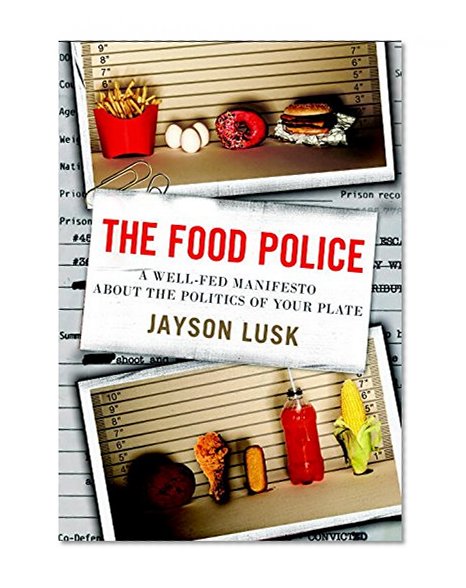The Food Police: A Well-Fed Manifesto About the Politics of Your Plate / Jayson Lusk
| List Price: | |
Our Price: $16.78 | |
|
For Bulk orders
| |
|
Used Book Price: $1.34 | |
| The Food Police: A Well-Fed Manifesto About the Politics of Your Plate / Jayson Lusk | |
| Publisher: Crown Forum | |
| Availability:Usually ships in 24 hours | |
| Sales Rank: 470792 | |
|
Amazon Q&A with Jayson Lusk

Q. In your book, you really pull the lid off of the hypocrisy surrounding “the food police†and the crusade against big food companies. Why?
A. Two reasons. The first is that, having grown up around many people involved in agricultural and food production, it was time to set the record straight, and to reveal that these folks are neither stupid nor sinister but rather care passionately about their land, their children, and the foods they make. Secondly, it was becoming apparent that the policies proffered by the food police were largely based on ideological agenda rather than empirical evidence that they’d actually work; rather, the evidence is that the implementation of those policies would harm the very people the food police purport to help.
Q. Do you think salt, sugar, and fat are really addictive? If so, can the “fat taxes†really save us?
A. Eating salt, sugar, and fat are enjoyable. Thus it shouldn’t be surprising that the reward centers of our brain get fired up when we eat them. The argument that these ingredients are addictive teeters on calling anything pleasurable addictive. Calling salt, sugar, and fat addictive is stretching the science to fit an agenda.
The economic research on “fat taxes†shows that the policy will have only trivial effects on weight. Adding a new tax is akin to lowering someone’s income, and few of us are happier with less money. The logic that “fat taxes†will actually help the people who are supposed to be helped is untenable.
Q. In your book, you discuss the importance of us consumers making our own choices. Are we as consumers really so weak as to succumb to the whims of Big Food and their flavor construction, marketing, and placement at the grocery store or deli?
A. There is schizophrenic paternalism that results from an awkward attempt to walk a fine line between a liberal agenda that yields to freedom of choice and expression when it comes to abortion, sex, speech, and drugs but stops short when those same freedoms might benefit evil corporations like Big Food. It is an odd position that posits us so weak as to fall for anything offered by Ronald McDonald or Tony the Tiger yet so strong as to know when to keep a baby alive or which truths to speak to power.
It is true, of course, that we are affected by advertising. However, much of the research shows that advertising is primarily used to persuade consumers to switch brands (rather than buy more). The truth is that Big Food can’t force us to buy anything, and they constantly scurry to meet our every whim.
Q. Are organic or locally grown foods actually better for you?
A. By and large, the answer is no. Numerous scientific studies have shown that the nutritional content of organic is essentially equivalent to conventional. Furthermore, it is a complete misnomer that organics are pesticide-free. Organic producers do use “natural†pesticides, many of which are more toxic than “synthetic†pesticides used on conventional farms. You have to remember that organics are much more expensive than the conventional, and if the choice is between eating fewer organic veggies (because they are more expensive) or more conventional veggies (because they are cheaper), the healthier choice is probably to go with the conventional. Local is a whole other issue, which I unpack in the book. You can eat unhealthy local food or healthy foreign food. One has nothing to do with the other.
Q. Are you concerned with the rise in obesity in America? What are some things that you think can improve this issue?
A. I think a better question is: what should the government do about your weight? That is a much more uncomfortable question but it is the better question to ask. There are a lot of personal incentives to reduce weight. The evidence suggests that people with very high levels of obesity earn lower wages, die sooner, have higher medical costs, and face a lot of social scorn. So, the question isn’t whether I’m concerned about obesity but rather whether the obese are concerned about it themselves.
The good news is that the upward trend in obesity is beginning to level off, and among some groups, has actually begun to decline in recent years. It is important to keep in mind the reasons why we experienced a rise in obesity in the first place, and many of those reasons—from less strenuous jobs to more convenient foods to more air-conditioned offices to less expensive food to the development of microwaves and dishwashers—are cause for rejoicing rather than dismay. That doesn’t mean we can look for ways to have our cake and eat it, too, only that we shouldn’t forget how we got the cake.
Now you can buy Books online in USA,UK, India and more than 100 countries.
*Terms and Conditions apply
Disclaimer: All product data on this page belongs to
 .
.No guarantees are made as to accuracy of prices and information.










